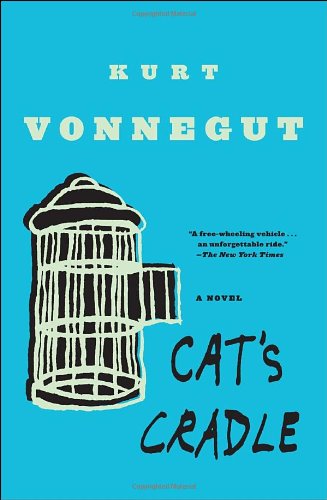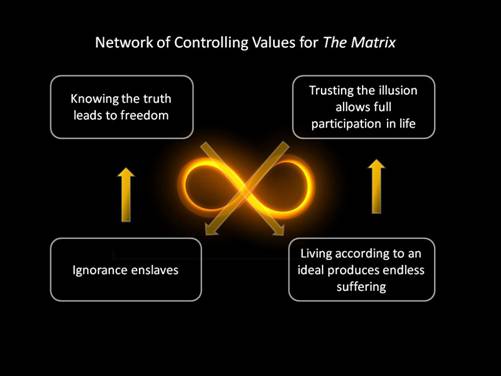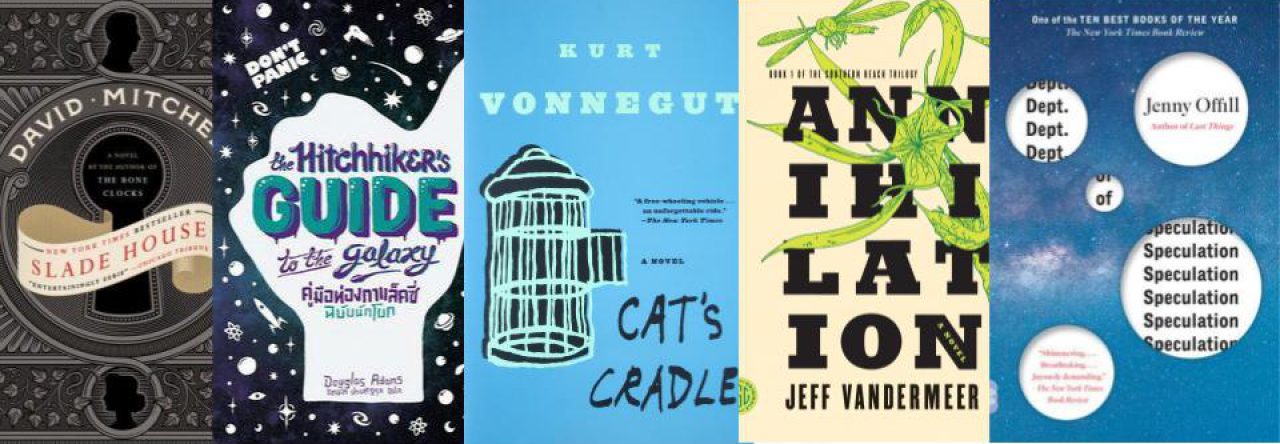
Cat’s Cradle by Kurt Vonnegut is a difficult book to explain to a person who hasn’t read it. There are so many turns and seemingly irrational plot points and deeply hidden themes that the whole story itself could be portrayed as a physical cat’s cradle.

What I can say is that the book follows a man who likes to call himself Jonah (whose original name was John). He tells us his failed attempt at writing an account about what important Americans were doing when the bomb was dropped on Hiroshima, Japan. We see him gather information from various eccentric characters, all interlocked with one another. And while all this is happening, Jonah is explaining how he was led to becoming a devout member of a religion known as Bokononism, in which all things that are told as truths are actually shameless lies.
So what could this all mean?
This was difficult for me to come up with because the story is “all over the place”.
But then again, this is what I am reading for. I knew what I was getting myself into when I chose this book. I had already read Kurt Vonnegut’s Slaughterhouse-Five, so I expected this story to be satirical and confusing. And those expectations have been met so far. It only raises my curiosity, and I am intrigued in learning about the meaning of Cat’s Cradle’s Story.
I decided to refer to the writings of Robert McKee, a writing expert we have read about a lot in class. One quote really stuck out to me-“A well-told story neither expresses the clockwork reasonings of a thesis nor vents raging inchoate emotions. It triumphs. In the marriage of the rational with the irrational.”
The best way to find the rational in the irrational is to come up with a network of controlling values.
In every story, there is a controlling idea- the idea that is the most prominent. Every controlling idea has two parts- purpose and context. The purpose is the reasoning for the controlling idea, and the context is the reasoning for the purpose. For every controlling idea, there is a counter controlling idea, which is the former’s complete opposite. The counter idea has its own purpose and context that help to have it make sense and be understandable.
Here’s a visual example of a network of controlling values for The Matrix:

So, this is one network my group came up with from the first thirty-five chapters of Cat’s Cradle:
By questioning everything, you may discover your own truths; not questioning anything will lead to ignorance and believing lies. However, being ignorant can save you from discovering hard truths; looking for truth will lead you to uncover things that will be hard to deal with.
To highlight this network, I wanted to focus on this one situation from the book, when Jonah asked Marvin Breed, the owner of Avram Breed and Sons, a tombstone establishment, who paid for a particular tombstone with an angel on it. (Page 72-73)
“There’s already a name on it- on the pedestal.”
“It was never called for?” I wanted to know.
“It was never paid for…. This German immigrant…his wife…died of smallpox here in Ilium. So he ordered this angel to be put up over her…..”
“But he never came back?” I asked.
“Nope.” Marvin Breed nudged some boughs aside…There was a last name written there. “There’s a screwy name for you,” he said. “If that immigrant had any descendants, I expect they Americanized the name. They’re probably Jones or Black or Thompson now.”
“There you’re wrong,” I murmured
…….
“You know some people by that name?”
“Yes.”
The name was my last name,too.
Purpose- By questioning everything, you may discover your own truths.
Jonah, in the pursuit of finding out who had ordered the tombstone, discovered that it was his own last name written on it. This may mean that his story was always meant to be intertwined with the Hoenikker family. The German Immigrant (who may be Jonah’s ancestor), bought the tombstone from Marvin Breed’s great-grandfather. Marvin Breed is the brother of Doctor Asa Breed, who loved Emily Hoenikker, the deceased matriarch of the family Jonah is learning about. Maybe it was his destiny to go interview them?
Anyways, the Immigrant couldn’t pay, but said that he would be back to pay for it and pick it up when he could. He never came back, and wasn’t part of any conversations until Jonah arrived (maybe saying that he is the descendent meant to return to pick up the tombstone).
Interestingly enough, Jonah Experienced his first vin-dit around this time, a Bokononist word meaning a “sudden, very personal shove in the direction of Bokononism, in the direction of believing that God Almighty” has some elaborate plans for him. Again, this hints that Jonah was always destined to go to the town of Iliad to meet with the Hoenikker children. Jonah says early in the book that those three children were surely included in his Karass, which Bokononists believe is a team that does God’s Will without ever discovering what it is doing.
Context- Not questioning anything leads to ignorance and believing lies.
If Jonah had never questioned Marvin Breed about the Immigrant and the tombstone, he would have just assumed that it was a personal tombstone for the Breeds themselves (which is why they refuse to sell it). He would have been ignorant to the fact that he had a possible connection with the Hoenikker family. He would have never experienced his first vin-dit, which had lead him to the path of becoming a full-on Bokononist. If he wasn’t into the religion, his whole story which he is telling us, would have played out, and been interpreted completely differently. Maybe all the events that he tells us about won’t be shameless lies anymore. Maybe we could have learned the real truth.
Purpose- Being ignorant can save you from uncovering hard truths.
If Jonah had chosen not to ask questions (which wouldn’t make sense since he is interviewing people for his book), he wouldn’t have learned that he was personally tied to the story of the Hoenikkers (meaning that he could keep himself at a comfortable space from them; he doesn’t have to worry much about them).
If he had chosen not to ask questions, Jonah would not have been thrust into Bokononism, radically altering how he views life, and getting rid of his Christian faith.
Context- In the pursuit of discovering truth you may uncover things that are hard to deal with.
Whether he liked it or not, Jonah, through asking the questions, had to deal with the fact that he was connected to the Hoenikker family. He might not enjoy their presence, but he will still be drawn to them.
And when the actual vin-dit happens, it wasn’t exactly pleasant for Jonah:
“There you’re wrong,” I murmured.
The room seemed to tip, and its walls and ceiling and floor were transformed momentarily into the mouth of many tunnels- tunnels leading in all directions through time. I had a Bokononist vision of the unity in every second of all time and all wandering mankind, all wandering womankind, all wandering children.
“There you’re wrong,” I said when the vision was gone.
The experience shakes him, and he can barely speak after it. Learning this possible truth was a bombshell for Jonah.
Here is a value graph- a way to show the battle between the controlling idea (+) and the counter controlling idea (-) in a specific scene (page 23):
Every class, he explained, got to pick distinctive colors colors for itself in its junior year, and then it got to wear those colors with pride.
(+) “What colors did you pick?” I asked. *Jonah is questioning this hoping to find out some valuable information about Franklin Hoenikker, the second of the three children*
“Orange and black.” * This is a straight answer that won’t change the graph*
(+) “Those are good colors.” * The original controlling idea is still ruling; this is Jonah seeing how the bartender will respond*
“ I thought so.” *I don’t see this affecting the graph*
(+) “ Was Franklin Hoenikker on the Class Council Committee, too?”
(-) “He wasn’t on anything,” said Sandra scornfully. (-) “He never got on any committee, never played any game, never took any girl out. I don’t think he even talked to a girl. We used to call him Secret Agent X-9.” * Sandra believes this and is ignorant of Franklin true self. She only knows him through what was observed/rumored of him. The graph is doing a major descent*
(+) “X-9?” *small positive*
(-) “You know-he was always acting like he was on his way between two secret places; couldn’t ever talk to anybody.” * Minor descent because Sandra is not giving much thought on the matter*
(+) “ Maybe he really did have a very rich secret life,” I suggested. *Rising, because this curiosity will eventually lead to truth*
(-) “Nah.” *Descending again*
(-) “Nah,” sneered the bartender. “He was just one of those kids who made model airplanes and jerked off all the time.” *not even considering Jonah’s words. Sharp descent*
At the end of this scene, the counter controlling value won out.
To close out this blog, I urge you to consider that another network of controlling values might work better for the rest of the story. In my experience, there have been a few times where the initial network evolved into something different over the course of the narrative. Of course, keep this current network in the front of your mind as you read, “plugging in” story beats to see if it still works. Story-wise, I think Jonah will continue to ask questions and experience vin-dits, finding out more about his connection to this whole narrative.
http://www.ifyoulovetoread.com/book/cats4.jpg
https://images-na.ssl-images-amazon.com/images/I/51pj5jRGyuL.jpg

Hey Alex! Great job on your blog! I love the use of the Cat’s Cradle game photo as a reference. After going over our network of controlling values in class, I played around with them a bit. I know Kopp had discussed fleshing out our first set of controlling ideas a little bit. I thought maybe to up the ante of the context, we could add the “ouch factor” he mentioned.
Ie. Not questioning anything leads to ignorance and living other’s dreams.
Purpose:
Ie. By questioning everything you may discover your own truths and live the life you want.
I also thought it was interesting how we discovered that many of the other groups’ books had similar values. Kopp suggested this idea of science vs. myth which in my opinion heavily aligns with our text (as well as The Hitchhiker’s Guide.) Discussing both Dr. Hoenikker as a scientist and religion in the form of Bokononism was a carefully crafted plan of the author to further sell the opposing values.
On page 5 Jonah quotes the book of Bokonon:
“All of the things I am about to tell you are shameless lies.”
This sentence alone does a great job of pulling the readers into the book’s network of controlling values. It forces the readers to constantly question if everything they come across in the book is true or not. We are then thrusted out of our comfort zone and forced to either submit to the text and believe everything it says or be skeptical and question everything.
LikeLike
Pingback: Cat’s Cradle: Living by the foma. – How Writers Read
Alex, really thorough blog. I completely agree with what you said about Cat’s Cradle being a hard book to describe unless you’ve read it. I think that the end turns out to really show what we were talking about in class. The people need Bokonon and his lies to create meaning in their own lives, but by doing so they’ve given up some of their agency, but they are also happy about it. It’s a crazy, complex set of ideas. Is there really harmful outcomes from the lies if people are happy to comply? In the end they all commit suicide because of what Bokonon tells them to do. I wonder how harmful it really is, if they were happy to do it. It makes me think about cults, and mass suicides in relation to them, it feels wrong, but who am I to say some can’t be happy and do what they want, even if that includes dying. But I don’t think I really feel that way, I don’t think I would want to follow Bokonon’s lies. Would I?
LikeLike
First off, starting this blog post off with the strong imagery and comparison of the complex nature of this narrative to a literal cat’s cradle is both effective and eye-catching.
Also, I love how you structure the latter part of the summary, concluding it with the essential question: so what does it all mean?
The quote from McKeee about the marriage of the irrational with the rational was absolutely perfect, Bravo!
Providing the concrete example of the controlling values that we came up with was brilliant in its execution, showing how such a simple decision can have life changing consequences, and that either way, it all boils down to a search of the truth vs. living a lie in comfort. Even if one is unaware of the lie, as they say, ignorance is bliss.
Concluding the blog with urging the reader to pursue their own interpretations, admitting even that our own set of controlling values has obvious faults and weaknesses when it comes to explaining the full complexity of this novel, serves as a great way to not only conclude the blog entry, but to encourage any reader to attempt to read and re-read the text to discover their own truths, even if it may cost them comfort and/or time.
LikeLike